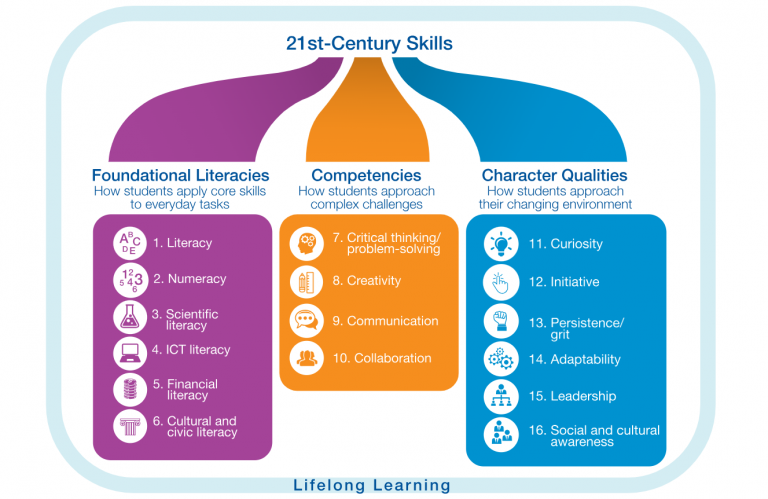A Parent’s Guide to 21st Century Skills
What are 21st Century skills?
Many organisations and thought leaders have tried to list what they think are the important skills for the 21st century. But when you look closely, they’re all talking about the same things: thinking critically, being creative, communicating well, solving problems, working with others, and being able to use and manage information. For the purposes of this blog, the Conflicted Parent is going to use the World Economic Forum’s (WEF) list of 16 critical skills that I mentioned in this post.
The WEF splits these skills into 3 areas: foundational literacies, competencies, and character qualities.
Foundational Literacies
The basic skills and knowledge you need to understand and engage with the world effectively, like reading and writing
- Literacy: The ability to read, write, speak, and listen in a way that allows us to communicate effectively and make sense of the world.
- Numeracy: The ability to understand and work with numbers.
- Scientific Literacy: The ability to understand and use scientific concepts and processes to make informed decisions about the world around us.
- ICT literacy: The ability to use digital technology, communication tools and/or networks to define, access, manage, integrate, evaluate, create and communicate information effectively and ethically.
- Financial literacy: The ability to understand and effectively use various financial skills including personal financial management, budgeting and investing.
- Cultural and Civic Literacy: The ability to understand different cultures and perspective and participate effectively in civic life.
Competencies
How you approach and handle a specific situation to achieve success
- Critical thinking: The ability to analyse information, evaluate arguments, and make decisions based on evidence.
- Creativity: The ability to think outside the box and come up with innovative solutions to problems.
- Communication: The ability to express oneself clearly and effectively, both verbally and in writing.
- Collaboration: The ability to work effectively with others, including those from diverse backgrounds and cultures.
Character Qualities
Personal traits and behaviours that shape how you interact with others and approach situations
- Curiosity: The desire to learn and explore new things.
- Initiative: The ability to act and make things happen.
- Persistence: The ability to persevere in the face of challenges and setbacks.
- Adaptability: The ability to adjust to new situations and changing circumstances.
- Leadership: The ability to inspire and guide others towards a common goal.
- Social and cultural awareness: The ability to understand and appreciate different cultures and perspectives.
To succeed, we don’t have to be experts in everything, but we do need a balance of foundational literacy, competencies, and character qualities. It’s the mix of these three that really makes the difference.
How do these skills get applied in the real world?
Let’s illustrate this with some real-world examples:
Sir David Attenborough has been exploring and documenting the natural world for over 60 years. Grounded in geology and zoology, which he studied at Cambridge, he has leveraged his scientific literacy to produce and present documentaries on natural history and environmental issues, where he uses his excellent communication and critical thinking competencies to explain complex scientific concepts in an engaging and accessible way. Among his character qualities is obviously curiosity: he has never ceased to be fascinated by learning new things that he can then tell us about. What may be less known are his leadership abilities. As controller of BBC2 in the channel’s infancy, he set the standard for “authored documentaries” and was responsible for commissioning programmes as varied as Match of the Day, Monty Python’s Flying Circus and The Money Programme.
You (and your children) may know Emma Watson primarily from her work on the Harry Potter movies, but she has also exhibited her literacy and cultural and civil literacy skills as an author of books and speeches on gender equality and women’s rights. She needed her communication competency to deliver those speeches at the United Nations and in many interviews. Emma Watson’s character qualities such as initiative and leadership drove her to create the HeForShe movement to promote gender equality.
Martin Lewis, founder of the MoneySavingExpert.com website has been promoting financial literacy and consumer rights for over 20 years, demonstrating not only his own financial literacy skills but also a healthy set of competencies and qualities including initiative, communication, collaboration and leadership. He explains complex financial concepts in an engaging and accessible way, and founded the Money and Mental Health Policy Institute, which aims to improve the lives of people with mental health problems by promoting financial education and support.
Success, for these British luminaries, as well as our children, requires a combination of all three areas – foundational literacy, competencies, and character qualities. This is what they need to thrive in an uncertain, complex, and frankly, tough world.
Convinced? Great, you’re in good company. Globally, there’s a consensus, from UNESCO to the WEF, EU, and the UK government, that new learning approaches are needed to address challenges. However, there’s a problem: ‘there is currently little or no substantial evidence available on the most effective tools and approaches to deliver those skills’.1
In the meantime, our education systems maintain the status quo – focusing on foundational competencies and standardised assessments. That’s not the right answer for today’s parents who must try to supplement the gaps.
But here’s where parents can make a difference. In the absence of a globally agreed map, many innovative educators are simply taking action, and you can too!
Join me on my journey to enrich my children’s education through meaningful family experiences, to prepare them for a future we’re only beginning to understand.


